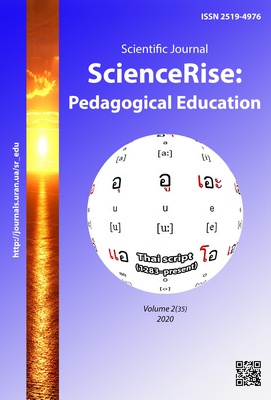Методика організації моніторингу психолого-педагогічної підготовки майбутніх викладачів закладів професійно-технічної освіти
DOI:
https://doi.org/10.15587/2519-4984.2020.192861Ключові слова:
викладачі, заклади професійно-технічної освіти, компетентність, методика, моніторинг, психолого-педагогічна підготовка, організаціяАнотація
У статті теоретично обґрунтовано процес організації моніторингу психолого-педагогічної підготовки майбутніх викладачів закладів професійно-технічної освіти, який містить п’ять етапів: І етап – цілепокладання та планування дослідження; ІІ етап – розробка інструментарію; ІІІ етап – проведення дослідження; IV етап – збирання та обробка результатів; V етап – аналіз та інтерпретація результатів дослідження.
На основі визначених компонентів психолого-педагогічної компетентності, виокремлено три критерії: особистісний, змістово-процесуальний, оцінно-регулятивний. При цьому кожен критерій є сукупністю кількох показників, які характеризують найбільш суттєві й необхідні прояви компонентів психолого-педагогічної компетентності майбутніх викладачів закладів професійно-технічної освіти. Обрано діагностичний інструментарій, який дозволяє оцінити рівні сформованості компонентів психолого-педагогічної компетентності майбутніх викладачів закладів професійно-технічної освіти за означеними критеріями. Зокрема, діагностичний інструментарій когнітивного компоненту складає: методи тестування: тест Дж. Равена, тест Р. Амтхауера (особистісний критерій: відповідність психофізіологічних особливостей професійним вимогам (психічні процеси: відчуття, сприймання, пам’ять, мислення, уява та увага)); метод тестового контролю, аналіз письмових і усних відповідей (змістовно-процесуальний критерій: теоретичні знання академічної області (гнучкість, міцність, розуміння); опитувальник мета когнітивної включеності у діяльність (оцінно-регулятивний критерій: мета-когнітивні знання (знання суб’єкта про особисті стратегії навчання), мета-когнітивна оцінка (судження про свої розумові можливості й обмеження, їхня необхідність у конкретній ситуації), мета-когнітивна регуляція (модифікації суб’єктом свого мислення).
Розкрито зміст експериментального впровадження методики організації моніторингу психолого-педагогічної підготовки майбутніх викладачів закладів професійно-технічної освіти (на прикладі перевірки рівня сформованості когнітивних та мета-когнітивних вмінь, навичок, знань та розумінь, що мають місце в оволодінні особливостями психолого-педагогічною діяльністю) та доведено обґрунтованість і адекватність дослідницьких інструментів та надійність отриманих даних.
Запропоноване дослідження дозволяє впливати на вирішення проблем кадрового забезпечення національного ринку праці та запобігання трудової міграції на етапі професійної освіти і навчання в цілому, та у контексті набуття здобувачами вищої освіти компетентностей для особистісної та професійної самореалізаціїі кар’єрного зростання впродовж життя зокрема
Посилання
- Pro zatverdzhennia Kontseptsii rozvytku pedahohichnoi osvity (2018). nakaz MON Ukrainy No. 776. 16.07.2018. Available at: https://mon.gov.ua/ua/npa/pro-zatverdzhennya-koncepciyi-rozvitku-pedagogichnoyi-osviti Last accessed: 21.01.20
- Lokshyna, O. I. (2004). Stanovlennia ta rozvytok monitorynhu yakosti osvity: svitovyi vymir. Monitorynh yakosti osvity: svitovi dosiahnennia ta ukrainski perspektyvy. Kyiv: K.I.S., 28–29.
- Avramenko, O. V. (Ed.) (2011). Vymiriuvannia v osviti. Kirovohrad: «KOD», 360.
- Bloom, B. S., Krathwohl, D. R. (1956). Taxonomy of Educational Objectives: The Classification of Educational Goals, by a committee of college and university examiners. Handbook I: Cognitive Domain. New York: Longmans, Green, 403.
- Bloom, B. S., Hastings, J. T., Madaus, G. F. (1971). Handbook on formative and summative evaluation of student learning. New York: McGraw-Hill, 923.
- Anderson, L. W., Krathwohl, D. R. et. al. (Eds.) (2001). A Taxonomy for Learning, Teaching, and Assessing: A Revision of Bloom’s Taxonomy of Educational Objectives. New York: Longman, 352.
- Churches, A. (2007). Bloom’s Digital Taxonomy, 44.
- Millenium Development Goals. Ukraine (2003). Ministry of Economy and European Integration of Ukraine. Kyiv, 27.
- Morhun, V. F., Titov, I. H. (2009). Osnovy psykholohichnoi diahnostyky. Kyiv: Vydavnychyi Dim «Slovo», 464.
- Dermanova, I. B. (Ed.) (2002). Metodika otsenki urovnia razvitiia moralnogo soznaniia (Dilemmy L. Kolberga). Diagnostika emotsionalno-nravstvennogo razvitiia. Saint-Peterburg, 103–112.
- Oprosnyk DUMEOLP – dyahnostyka urovnia moralno-etycheskoi otvetstvennosty lychnosty Y. H. Tymoshchuka. Available at: http://tpcollege.ru/docs/psysluzhba/3moralnoetich.pdf Last accessed: 21.01.20
- Trofimov, Yu. L., Rybalka, V. V., Honcharuk, P. A. et. al.; Trofimov, Yu. L. (Ed.) (2001). Psykholohiia. Kyiv: Lybid, 560.
- Metodika izucheniia logichnosti myshleniia (Progressivnye matritsy Ravena). Available at: http://www.miu.by/kaf_new/mpp/129.pdf Last accessed: 21.01.20
- Test struktury intellekta R. Amtkhauera. Available at: http://vsetesti.ru/443/ Last accessed: 21.01.20
- Karpov, A. V., Skitiaieva, I. M. (2005). Psykholohiia metakohnityvnykh protsesiv osobystosti. Available at: http://psih.pp.ua/ Last accessed: 21.01.20
- Metodika mnogofaktornogo issledovaniia lichnosti R. Kettella. Available at: http://psycabi.net/testy/293-16-faktornyj-lichnostnyj-oprosnik-r-b-kettella-metodika-mnogofaktornyj-oprosnik-kettella-test-kettela-187-voprosov-test-ketela-16-pf Last accessed: 21.01.20
- Test kommunikativnykh umenii L. Mikhelsona. Available at: https://sites.google.com/site/test300m/tku Last accessed: 21.01.20
- Klochko, V. Ye. (Ed.) (2003). Vikova psykholohiia. 2003. Available at: http://medbib.in.ua/vozrastnaya-psihologiya782.html Last accessed: 21.01.20
- Kryvylоva, O. A. (2018). The projection of psychological and pedagogical training of future professional and technical educational establishments’ teachers. Khmelnytskyi: Khmelnytska humanitarno-pedahohichna akademiia, 546.
##submission.downloads##
Опубліковано
Як цитувати
Номер
Розділ
Ліцензія
Авторське право (c) 2020 Олена Анатоліївна Кривильова

Ця робота ліцензується відповідно до Creative Commons Attribution 4.0 International License.
Наше видання використовує положення про авторські права Creative Commons CC BY для журналів відкритого доступу.
Автори, які публікуються у цьому журналі, погоджуються з наступними умовами:
1. Автори залишають за собою право на авторство своєї роботи та передають журналу право першої публікації цієї роботи на умовах ліцензії Creative Commons CC BY, котра дозволяє іншим особам вільно розповсюджувати опубліковану роботу з обов'язковим посиланням на авторів оригінальної роботи та першу публікацію роботи у цьому журналі.
2. Автори мають право укладати самостійні додаткові угоди щодо неексклюзивного розповсюдження роботи у тому вигляді, в якому вона була опублікована цим журналом (наприклад, розміщувати роботу в електронному сховищі установи або публікувати у складі монографії), за умови збереження посилання на першу публікацію роботи у цьому журналі.









